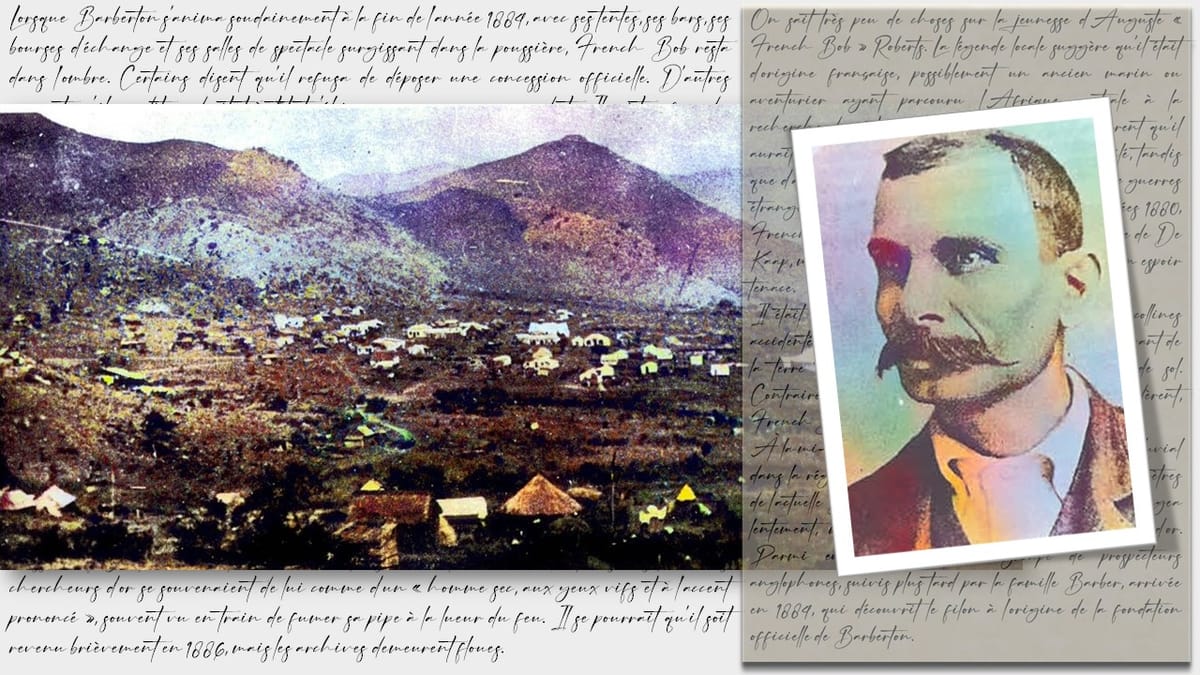French Bob: The mysterious gold digger who lit the fire before Barberton’s boom
The enigmatic loner whose 1883 gold find helped spark the birth of Barberton.

In the colourful lore of Barberton’s golden beginnings, few figures are as mysterious, or as important, as French Bob. Long before the Barber brothers struck gold at Umvoti Creek in 1884, a solitary prospector named Auguste Robert, known only by his nickname “French Bob,” discovered gold along Concession Creek in 1883. His quiet strike would become the tremor before the gold rush earthquake that gave rise to Barberton.
Very little is known about the early life of Auguste “French Bob” Roberts. Local legend suggests he was of French descent, possibly a former sailor or adventurer who had roamed southern Africa in search of fortune. Some stories whisper of aristocratic roots and exile, while others claim he had once fought in foreign wars. What we do know is that by the early 1880s, French Bob had taken to the veld near the De Kaap Valley with nothing more than a pickaxe, pan, and stubborn hope.
He was known to keep to himself, camped in the rough hillsides east of what would become Barberton, living off the land and quietly testing soil samples. Unlike the boisterous characters who followed, French Bob never sought the spotlight.
In mid-1883, French Bob reportedly found alluvial gold in the Concession Creek area, about 7 kilometres from present-day Barberton. Word of his find spread slowly, but it caught the attention of other fortune-seekers. Among them were a group of English-speaking diggers, and later, the Barber family, who arrived in 1884 and struck the reef that would lead to Barberton’s official founding.
Although Bob never received official credit, many in the early camps agreed: “French Bob was first.”
When Barberton exploded into life in late 1884 with tents, bars, stock exchanges and music halls rising in the dust, French Bob kept to the shadows. Some say he refused to stake a formal claim. Others believe he sold his rights early and walked away with a modest sum. There are even rumours he left Barberton altogether, heading for the eastern lowlands or Mozambique’s coast.
No one knows exactly what became of him. But his legacy lived on in the minds of diggers and dealers, who often raised their glasses in the saloons to toast “the man who found it first.”
Unlike flamboyant figures like Cockney Liz or entrepreneurs like Sammy Marks, French Bob never had buildings named after him or plaques in his honour. Yet his role in the pre-Barberton gold stirrings was undeniably pivotal. Without his quiet discovery, the valley might have remained a sleepy outpost for years longer.
Today, the stream once known as Concession Creek runs quiet again. But for those who know their history, its waters still murmur tales of the loner who arrived before the crowd, dug into the earth, and sparked a gold rush.
Some rumour about French Bob was that he was believed to have lived in a grass hut on the edge of the creek, avoiding town life even after the boom began. Some early diggers recalled him as “a wiry man with sharp eyes and a thick accent,” often seen smoking a pipe by firelight. There is speculation that he may have returned briefly in 1886, but records are unclear.
As Barberton celebrates 141 years, it’s worth remembering the men like French Bob, the quiet pioneers, the ones who saw promise in the rocks before history gave them a name. His story reminds us that behind every gold rush, there are unsung prospectors who changed the course of towns, nations, and lives.





Comments ()